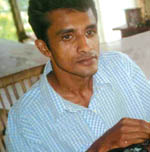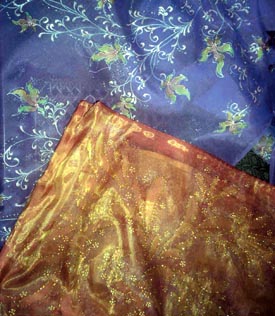|
DAILY NEWS ONLINE |
|
|
|
OTHER EDITIONS |
|
|
|
|
|
|
|
|
|
OTHER LINKS |
|
|
|
|
|
|
  |
|
Kamal Karunaratne: He decorates the six-yard drape
THE artist who at present is busy transforming leading designer Aldo Perera's creative ideas into reality is Kamal Karunaratne who has worked for some of the leading textile design outfits since he started at a very tender age years ago. As a carpenter's son Kamal has been witness to a lot of beautiful furniture produced by his father, specially the floral decorations that he carved out on bedsteads and head rests of living room furniture. Most of his present work is also mostly based on flowers and decorative designs that at one time captured his tender mind during the times he spent in his father's carpentry workshop as a child. Kamal is a freehand artist creating motifs to fit in with the creative thinking of Aldo who is today, the busiest designer in Kandy having served the design needs of the Kandyan elite for over fifty years. Kamal on the other hand has become a part of Aldo Perera's studio meting out a variety of designs that fulfil the needs of Aldo's many clients. Kamal works mostly from his home in Avissawella where he has his family. "Aldo gives me a lot of work to take home so that I am occupied most of the time while being close to my family". It is a pleasant experience to watch Kamal at work as he is quick and creative drawing out freehand designs mostly on borders and the fall of saris in variety of colours, stretching them out on a large frame and working on them, keeping a steady pace in time to finish the work, so that it can reach the clients' deadline. The self-taught artist has actually started as a tracing artist first at Jafferji Brothers, known at one time as the country's pioneer fabric manufacturer. Later he began working directly as a designer until he got a break at Cyntex yet another textile manufacturing company that is still in existence. It was in later years that Kamal actually received a free hand in creating his own designs, that was when he got the opportunity to work at Kandy's one of Sri Lanka's big time handloom manufacturers where Kamal designed for clothes and mostly for upholstery which was the company's main line of work.
"God has been kind to me by finding me humble people such as Aldo and his family to work for", said Kamal explaining that they are not plainly interested in running a business alone as much as being of help to others through the business they conduct. Kamal paints pictures as well many of his creations done with oils on canvas has been promoted and sold by Aldo. He also mentioned that enormous support is extended to him and his family by his relatives that live in Australia. ################## SSRC awards 18 schols to South AsiaTHE South Asia program of the Social Science Research Council (SSRC) New York recently announced the recipients of its South Asia Regional Fellowships. Eighteen fellowships have been awarded this year after a rigorous selection process conducted by an international panel of experts. Two of this year's winners are from Nepal, three from Sri Lanka, four from Pakistan, and nine from India. hinged on themes of regional significance, the program is a step towards bridging the gap between teaching and research in higher education. Founded in 1923, the Social Science Research Council (SSRC, New York) is the world's oldest social science research organisation. Mandated to build a knowledge base for the comprehension of public issues, the Council seeks to narrow disciplinary and institutional boundaries in the social sciences and humanities. The SSRC conducts over 30 research programs across the globe, addressing issues such as HIV\AIDS, children in armed conflict, development and inequality, global security and cooperation, citizenship and international migration, amongst others. SSRC's commitments in South Asia date back to the 1950s and collaborations with leading South Asian scholars of the time, including Professors Rajni Kothari, T.N. Madan, and the late Mahbub ul Haq. It facilitated the establishment of the Indian Council of Social Science Research (ICSSR) and implemented a decade long fellowship in the 1990s to encourage US based scholars to do research in Bangladesh. The South Asia Program, under the aegis of Professor Partha Chatterjee, conducted the first region-wide investigation into the state of social science research capacities in South Asia. Providing a forward-looking assessment of needs and potential in these countries, this report paved the way for existing interventions such as the South Asia Regional Fellowship Program. Other significant activities in the region include a Handbook on Social Science Terms and Concepts in Nepali. This project engaged eminent Nepali and foreign practitioners and academics, examining not only the ways in which knowledge and action in Nepali society are being altered by powerful external discourses, but also creating a critical space in which articulation of local understandings of society and history was attempted. Dr. Seteney Shami, who directs International programs at SSRC, as currently taken over charge of the South Asia Program. Commenting on the future of the fellowship program which has recruited 55 scholars in the past four years, Dr. Shami stated: "I look forward to exploring how the SSRC can continue its commitment to working in South Asia and build on its past successes with cross-regional collaborations and expansions. Overall, I am extremely delighted that each year, several meritorious academics from non metropolitan centers of learning across South Asia have been chosen for this award. As a consequence of this fellowship, new scholarship has emerged in areas ranging from politics of resources and aid to gender and sexuality." The fellowship program is administered through regional partner organisations to make it convenient for local scholars to get information and support in the application process. The SSRC's regional partners are: The Centre for Alternatives in Dhaka, Bangladesh, the Centre for Studies in Social Sciences Calcutta, India, the Social Science Baha in Lalitpur, Nepal, the Sustainable Development Policy Institute, Islambad, Pakistan, the Social Scientists' Association, Colombo, Sri Lanka. Regional program staff conducts seminars at universities and colleges, to encourage meritorious scholars based in provincial institutions to apply. Research proposal training workshops are also held to hone the writing skills of young scholars. This year, such as an event was organised by the Social Science Baha and attended by several scholars from Tribhuvan University and affiliated colleges. Each year, the fellowship seeks submissions on themes of regional importance. Among those floated in past years include resources and society, migration, and the construction of bodies, states and societies in the social sciences. The theme for this year's competition was 'The 'long' 1950s'. This examines the ordinary moments of nation building in the region, as a crux for understanding political, economic and socio-cultural processes currently in motion. The fifties saw the birth of new sates and social movements, redefinitions in art and culture and visions that shaped economic development. Commenting on the significance of the theme for Nepal, Professor Deepak Gyawali, Advisory member to the South Asia Program, said: "For Nepal, this period was that interregnum between the end of the Rana rule and the rise of the Panchay at regime. Though seemingly anarchic, it was bursting at the seams with creativity in areas as diverse as literature, education, politics, legal system, public adminstration, communications and many other domains. What happened in these fields then continues to demonstrate its birthmark impact in today's Nepal. This era deserved to be studied from a richer array of perspectives." As part of the fellowship, the awardees will attend an annual workshop prior to the start of their fellowship tenure. An annual event, guided by a panel of international resource persons, the workshop will expose SSRC fellows to contemporary theoretical approaches and facilitate regional networks. Comprising lectures and panel discussions, this year, the workshop will be held in Negombo, Sri Lanka. SSRC's Regional Project Manager, Malani Sur emphasized. "This event facilitates space for scholarly dialogues across boundaries, where participants engage critically with the theme from a range of interdisciplinary understandings. This provides the much needed impetus for writing up completed fieldwork/research for publication. Along with SARN (http://sarn.ssrc.org), an electronic forum that promotes the production, exchange and dissemination of social science knowledge and practices, we hope that SSRC's endeavours in the region will encourage partnerships between institutions and individuals to prepare the next generation of social scientists." The fellowship requires scholars to take time off their teaching and administrative duties. The fellowship thus, facilitates active research away from heavy academic responsibilities, which is essential to maintain the quality of both research and teaching. Fellows affiliate with research canters during the fellowship tenure, thereby reversing the trend of compartmentalizing teaching in universities and research in specialized institutes. As a further measure in this direction, fellows are encouraged to incorporate their research into their regular work by modifying existing courses they teach, by introducing new courses. SSRC South Asia Fellowship Awardees for 2005-2006 Deeptha Achar, MS University of Baroda, India; Oscar Amarasighe, University of Ruhuan, Sri Lanka; Tapan Basu, Hindu College, India; Santosh Dash, Arts and Commerce College, India; Vaishali Diwakar, St, Mira's College, India; T.T. Haokip, North Easter Hill University, India; Nalani Hennayake, University of Peradeniya Sri Lanka; Mala Lalvani, University of Mumbai, India; Salma Malik, Quaid i Azam University, Islamabad; Pakistan; Fazal Rahim Marwat, University of Peshawar, Pakistan; Yogesh Ram Misra, Nepal Engineering College, Nepal; Jagath Munasinghe, University of Moratuwa, Sri Lanka; Shiva Rijjal, Padmakanya University, Nepal; Sayed Wikar Shah, Quaid i Azam Univeristy, Islamabad, Pakistan; Chitra Sinha, RJ College, India; Bhabananda Takhellambam, C.I. College, India; Nadeem Omar Tarar, National College of Arts, Pakistan; Gita Viswanath, MS University of Baroda, India. (For further information and queries contact: [email protected]) ################ Review: A delight to theatregoersRecital presented by Mary Anne David - October 2
|
||
|
|



